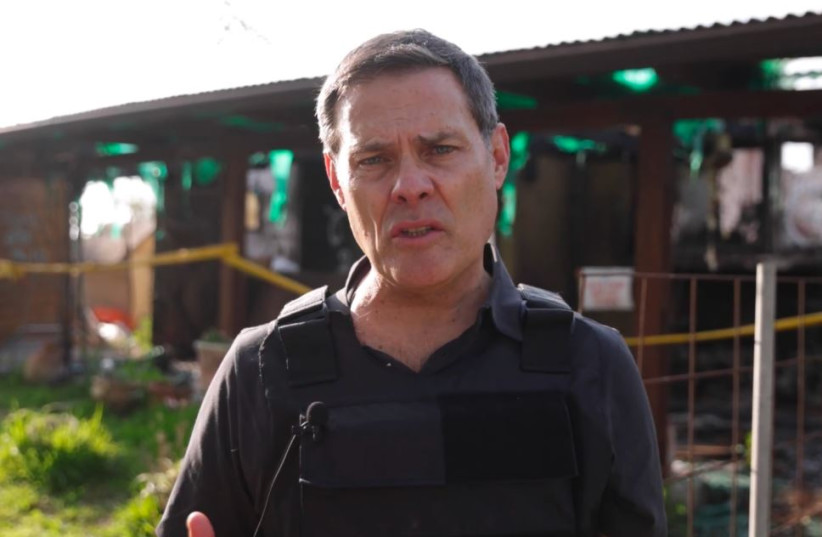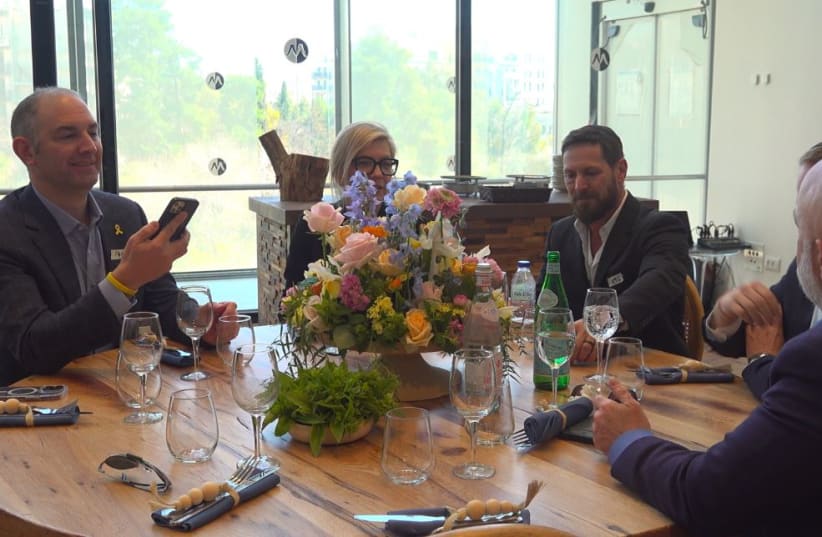Six months into the conflict between Israel and Hamas, the Jewish state’s tourism sector has faced significant upheaval. Instead of traditional leisure travelers, the visitors now are mostly on solidarity missions, signaling a notable shift towards what is referred to as “war tourism.” However, ELNET is working to restore the dynamics of international relations and defense collaborations to their former glory, taking inspiration from pre-war trips.
David Siegel, president of Friends of ELNET, told The Media Line that following a successful mission in February 2022, Germany purchased Israel’s Arrow 3 defense system as part of a landmark defense agreement. “They went back home, they purchased munitions for their drones. They came back to Israel, and now Israel’s largest defense export in Israel’s history went to Germany.”
Among the representatives from France, Germany, Estonia, Latvia, Lithuania, and the US was German MP Sandra Weeser. Like many other politicians, she toured what remains along Israel’s border with Gaza. Weeser—chairwoman of Housing and Construction in the French-German parliament's bureau and Chairwoman of the Working Group Defense and Security—shared her thoughts on the experience with The Media Line: "I felt bad because I had the impression that I’m a voyeurist.”
Visiting the remains of the Gaza border villages feels voyeuristic
“I’m going there for a kind of ‘mass tourism,’ but on the other hand, yesterday evening, when I rethought all [of] this, I found that it’s important to see it to really understand, to get close to it."
Seigel explained that ELNET was created to form a pro-Israel network in Europe that would cover all 44 countries and develop support for Israel in the parliaments, in the governments, in the militaries, in the high-tech sectors to embed Israel and Europe and to embed Europe and Israel. He explained the reasoning behind this: “We’re in a complicated global environment where the United States is a very important ally. But, the United States needs coalitions in order to operate. You see it against the Houthis in Yemen.”
“Israel needs coalitions in order to operate. Fighting Hamas is not just a military campaign. It’s a financial campaign. It’s an international campaign.” He pointed to the many fronts that Israel is facing, adding, “We’re fighting the Persian Empire and all of its arms, and behind that Persian Empire is Russia and China, and the Jewish State can do a lot, but it can’t do everything all on its own, nor can the United States.”
Dan Hoisman, founder and president of DH Castle Development and Construction, recognized the importance of Israel maintaining partnerships with countries other than the United States. He told The Media Line: “Recognizing the whole [picture] that Europe is a greater trading partner than the United States, combined with the fact that the United States has developed some very disturbing foundational principles that are contrary to the founding of the country, and are contrary to what Israel stands for, I don’t think Israel can count on the United States like it used to, and maybe it should never have.”
In the spirit of this, many ELNET participants work to improve relations with Israel in their home countries. Lithuanian parliament member Dovilė Šakalienė explained to The Media Line that she regularly meets with Israeli Ambassador Hadas Wittenberg Silverstein.
“She’s absolutely amazing,” she added. “And she has been organizing meetings, reviewing of video, [and] materials and photos and listening to the stories since the invasion of Hamas to Israel. And it was terrifying. It was shocking, but what I saw here, it’s heartbreaking.”
Šakalienė expressed anger toward what she described as a “double standard” that applies to “small nations versus big nations,” offering a comparison to the Holocaust: “We want to ensure that there is retribution for [the] Israeli people for Shoa; for [the] Holocaust that they have endured.”
“But at the same time, when they defend themselves, we blame them and punish them for efficient defense, and it brightened my eyes to see that this is simply intolerable.” She made an additional comparison, noting that what she saw in Ukraine and in the communities near Gaza were “absolutely identical—rape, maiming, torture, murdering, burning people alive [and] kidnapping people.”
Israel is constantly held to a double standard
She continued: “Russians have kidnapped hundreds of thousands of Ukrainian children with a goal to erase their identity. Now, when hostages from Israel are taken and tortured, that, for me, is the same message. You do not have a right to exist. We are going to exterminate you.”
When asked by The Media Line about the suffering of the Palestinians in Gaza following Oct. 7, Šakalienė responded, “This is actually another illustration of double standards. I mean, who started the war? And who took hostages? And who is claiming its goal to exterminate the Jewish people?”
“Why is Hamas not being blamed for throwing away millions, probably billions of dollars and euros from [the] European Union, from [the] United Nations, from [the] United States to build underground tunnels where they torture people, where they let the rockets of their own production onto the peaceful citizens of Israel?”
Not all of the participants who came to Israel are politicians. Laurent Morali, CEO of Kushner Properties, told The Media Line that he wanted to travel with ELNET and European MPs in the hope that they would use their influence back home.
“I’m hopeful that next time they have to vote on a resolution as to the conflict, they will not only make the right decision but convince others in their parties or across the aisle to make the right decision because it’s a universal issue,” he explained. “It’s not a Right or Left issue. It’s good versus evil.”


In that vein, he noted that antisemitism in his home country of France has changed. “At the beginning of the 20th century and throughout World War II, of course, it was coming from the Far Right, and now what we’re seeing is that it’s coming from the Far Left, which is becoming more and more popular.”
“One thing I want to mention about that,” Morali said to The Media Line, “yesterday when we were in Kfar Gaza, someone asked why the mattresses of all these poor people were outside. The soldier explained that after Hamas terrorists came and did what they did, many civilians from Gaza essentially looted the homes. They have been told in their education that Jews hide money in the mattresses. That's what they wanted to do—to find that money, if it exists.”
“I could see on the faces of most of my French, German, and Baltic counterparts the astonishment at that act. Are we really in 2024? Do people still believe this in 2023? Unfortunately, the answer is yes,” Morali continued. “So, in a way, I think they are seeing in their own understanding the root of that evil, which is the education system in Gaza, or the lack thereof, and that we have to completely change the way things are taught in the Palestinian Territories.”
Šakalienė, for her part, noted that when it comes to discussions of Israel and antisemitism, she doesn’t think there is a simple solution. “The most important thing is that we do not really have the luxury to have illusions that there are simple immediate solutions for the complications that are brought upon us by terrorists and aggressors, she continued. “What we can do is try to fight them and survive them. I do not have an answer as well.”
However, according to Hoisman, part of the solution lies in “the light [the] country brings,” citing Israel’s “unity, resilience, optimism, and strength” as reasons why.
“It doesn’t matter what the world does,” he said. “We’re going to survive, and we’re going to win, with or without them.”
